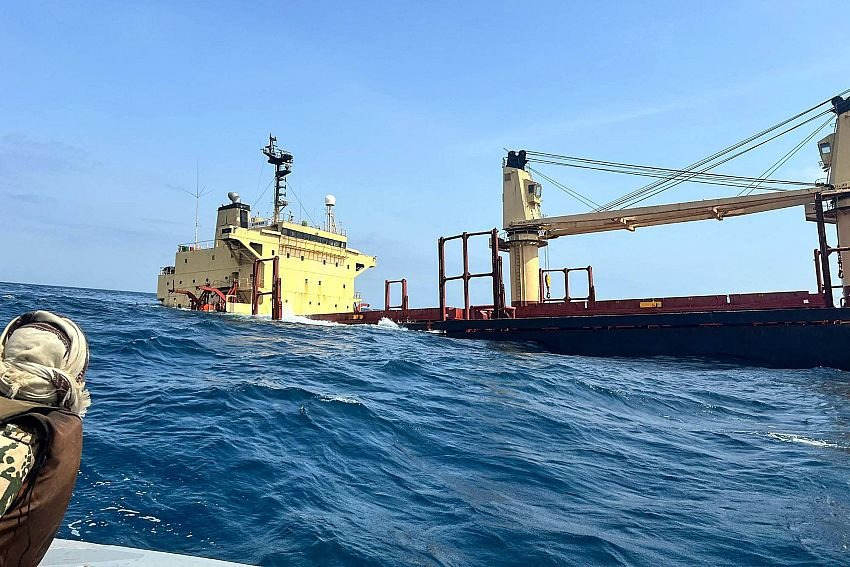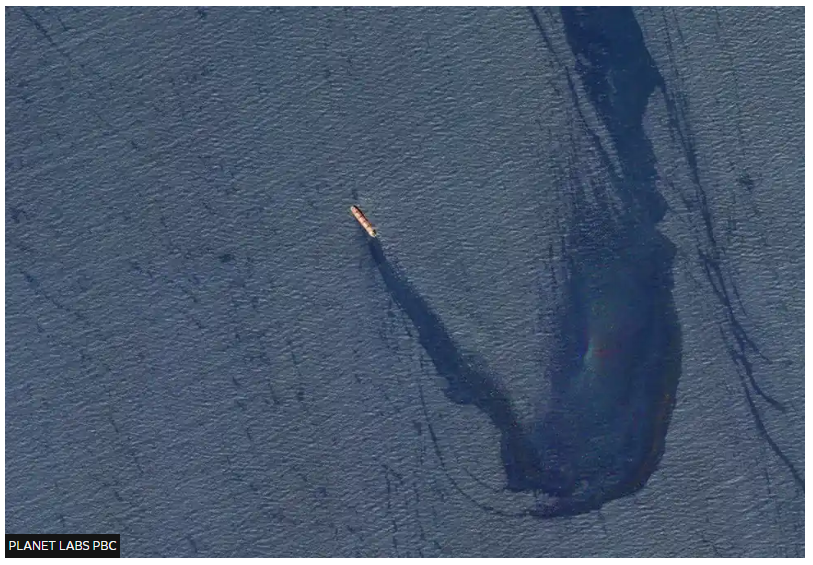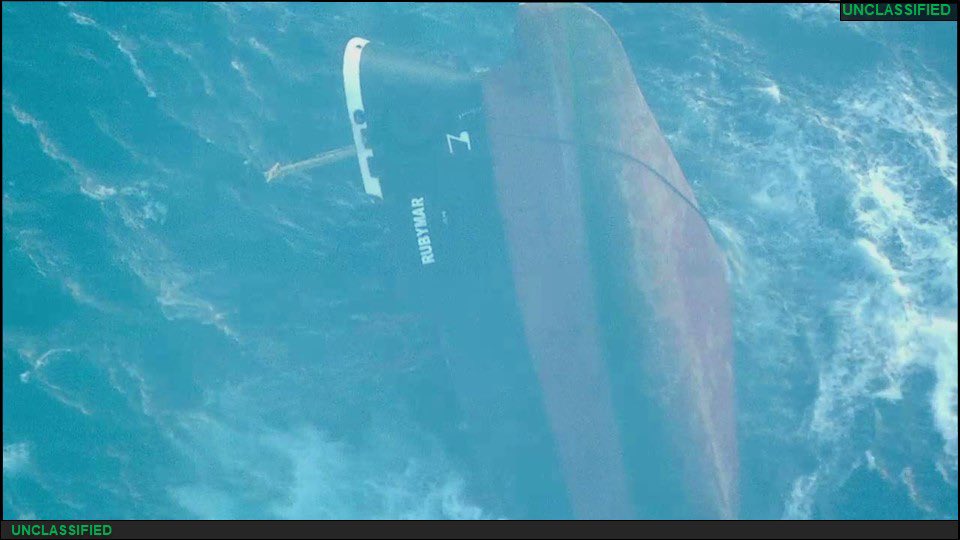
Saba agency
06-03-2024 at 12 PM Aden Time

’The real danger is probably the undisclosed cargo. The entire cargo is of 41,000 tons. We have no information about nearly 20,000 tons.’
Abdullah Al-Shadli (South24)
On Saturday, March 2, the Internationally-Recognized Yemeni Government announced that British ship ’Rubymar’ had sunk near the Yemeni island of Hanish off the Mocha coast, nearly a fortnight after being attacked by Houthi missiles in the Red Sea. The sinking of Rubymar, which had been leaking fuel for days, comes amid warnings of an unprecedented environmental catastrophe in the Red Sea
#Videographic
— South24 | English (@South24E) March 3, 2024
Hit by #Houthis, British ship Rubymar sinks in the Red Sea#south24 pic.twitter.com/rohIjBBYj6
The cargo ship was transporting more than 41,000 tons of fertilizers when it was struck by two Houthi missiles on February 18 which severely damaged it. On February 29, a Houthi drone attack hit the surroundings of the vessel and targeted a boat owned by Yemeni fishermen, some of whom were killed and some injured, according to the Yemeni Foreign Ministry.
So, what are the Environmental Ramifications of the Sinking of ‘Rubymar’ in Yemeni waters?
The Ship’s Cargo
According to the specialized navigation website ’MarineTraffic’, ‘Rubymar’, which is registered in the United Kingdom under the flag of Belize, is a bulk carrier. Its length overall (LOA) is 171.6 meters and its width is 27 meters.
According to the Yemeni Government, ‘Rubymar’ was 25 nautical miles from the Port of Mocha at the time of the attack while carrying more than 41,000 tons of the highly-dangerous IMDG 5.1 fertilizer along with shipments of oil and fuel.
“The approximately 21,000 metric tons of ammonium phosphate sulfate fertilizer that the vessel was carrying presents an environmental risk in the Red Sea,” as per the US Central Command. It posted on X that “the sinking also presents a subsurface impact risk to other ships transiting the busy shipping lanes of the waterway”.
The environmental website ‘Green Garage Blog’ said that “Chemical fertilizers like ammonium sulfate are not an environment friendly solution. It gets made with products from the petroleum industry, which means it is not a sustainable item. Organic fertilizers have a lesser risk of leaching into local water sources, so there is always a risk of pollution when using this product”.
Environmental Repercussions
During an exclusive interview with ‘South24 Center’, environmental expert Abdul -Qadir Al-Kharaz, the former Head of the ‘Yemeni Environment Protection Authority’, stressed on the high risks related to the cargo of ‘Rubymar’. He said: “We are talking about 20,000 tons of ammonium phosphate sulfate. It is a chemical substance used as an artificial fertilizer, not a natural one.”
He added: "Even natural fertilizers have their own impact. Thus, when large quantities of these chemical fertilizers dissolve and seep into the water, this leads to dangerous environmental repercussions.”
However, Al-Kharaz believes that the real danger is probably from the undisclosed cargo of Rubymar. According to him “the ship’s cargo is of 41,000 tons. Therefore, we have no information about nearly 20,000 tons. There have been only reports about it carrying amounts of diesel and mazut (a low-quality fuel oil) that don't exceed 1,500 cubic meters.”
Al-Kharaz stressed that the reported18-mile-long oil slick due to leaking fuel from the damaged ship days before its sinking, has not yet been determined. He said: “This is another flaw in the work of the ‘Crisis Cell’, formed by the Yemeni Government, as it unfortunately didn’t collect samples from the vessel before it sank.”

The oil slick caused by ‘Rubymar ’(US Central Command)
The Yemeni expert pointed out that “If the fertilizers are expired, then it will have very serious repercussions.” He doesn’t rule out that the sinking of ‘Rubymar’ could have been “intentionally planned with an aim to bury the hazardous waste in the Red Sea”. He stressed that “the failure to take action and save the vessel by its operating company after the Houthis targeted it raises pertinent questions.”
He explained: “It is important to know that this ship was manufactured in 1997. It is considered at the end of its life span. The substances that were on board the ‘Rubymar’ can’t be traced after they mix with water and dissolve. Thus, this will affect the properties of the water and pollute it.”
“This will in turn have an impact on the marine life, whether plant or animal, and lead to the deaths of many species. The chemicals will also kill the weeds and algae and lead to a lack of dissolved oxygen in the water and subsequently the death of other marine organisms,” according to the expert.
The worst thing, according to Al-Kharaz, is that when some living organisms like molluscs absorb these chemical substances, it doesn’t lead to their death directly but is deposited inside their bodies. These organisms would spread the poisons among those who eat them. Thus, this can lead to the emergence of dangerous diseases in the near future”.
He continued: “The major effects will be seen in the Yemeni areas and beaches. However, they will reach other riparian countries as well, especially since these poisons are carried within the bodies of these living organisms that didn't die.”
In a previous report, the Associated Press said: “Aggravating concerns over the Rubymar’s sinking is the Red Sea’s unique circular water patterns, which operate essentially as a giant lagoon, with water moving northward, toward the Suez Canal in Egypt, during winter and outward to the Gulf of Aden in summer.” It quoted an expert as saying “What spills in the Red Sea, stays in the Red Sea.”
The report also said that the leaking oil can also clog the world’s largest network of desalination plants, which has been built by Saudi Arabia, and “inflict costly damage on the saltwater conversion.”
The news agency pointed out that “even before plunging to the ocean’s depths, the vessel had been leaking heavy fuel that triggered an 18-mile (30 km) oil slick through the waterway, which is critical for cargo and energy shipments heading to Europe”.
According to it, “the Red Sea is also a vital source of seafood, especially in Yemen, where fishing was the second largest export after oil before the current civil war” which erupted in 2015.
The report quoted an expert as saying “while the amount of oil the Rubymar leaked is unknown, it couldn’t have exceeded 7,000 barrels”.
The expert stressed that “while that’s a mere fraction of the Safer’s load, it’s significantly more oil than was spilled by a Japanese-owned vessel, the Wakashio, that wrecked near Mauritius in 2020, causing millions of dollars in damages and harming the livelihood of thousands of fishermen”.
In terms of the hazardous fertilizers the vessel was transporting at the time of the attack, the expert said: “If the Rubymar remains intact underwater, the impact will be a slow trickle instead of a massive release. Fertilizer fuels the proliferation of algae blooms like the ones seen every year in the Texas Gulf Coast as a result of far larger nutrient runoff from farms, urban lawns and industrial waste. The result is the loss of oxygen, asphyxiation of marine life and the creation of so-called dead zones”. This would also threaten the “world’s most colorful and extensive coral reefs” found in the Red Sea.
 After the sinking of ‘Rubymar’ (US Central Command)
After the sinking of ‘Rubymar’ (US Central Command)
On Saturday (March 2), Yemeni Prime Minister Ahmed Bin Mubarak, during a meeting with US Ambassador to Yemen Steven Fagin, warned of a massive environmental disaster due to the sinking of ‘Rubymar’. He urged the international community to “take practical and urgent action and establish an international emergency cell to save the Red Sea and address the environmental disaster resulting from the sinking of the vessel”.
Yemeni Transport Minister Abdulsalam Hamid said, in statements published by Saba News on Saturday, that the “Maritime Affairs Authority sent an urgent message to the Chairman of ‘the Regional Organization for the Conservation of the Environment in the Red Sea and Gulf of Aden’ which is based in Jeddah”. It informed the Chairman about the sinking of the ship and asked for help to avert the environmental impact caused by the hazardous substances that were on board the vessel. It hopes that there will be a quick response.”
Hamid underscored that his ministry will appoint an international lawyer, through the ‘Maritime Affairs Authority’, to pressure the vessel’s owners to help in preventing the impending maritime disaster caused by the sinking of the ship and its cargo which will impact the fisheries in Yemen, according to ‘Saba’.